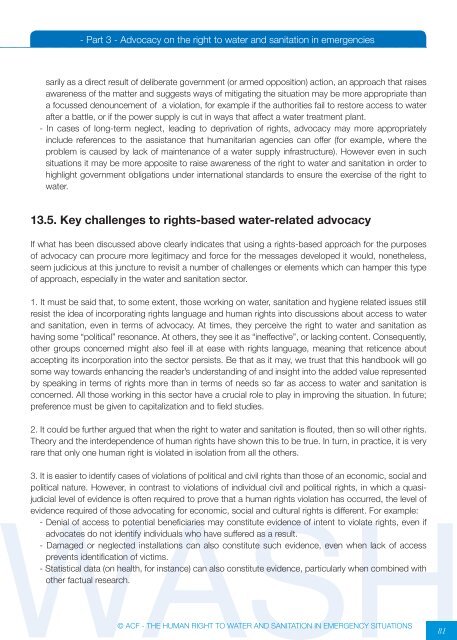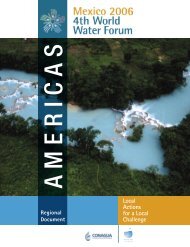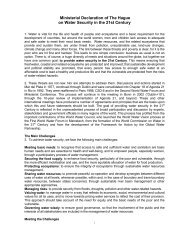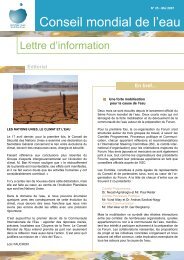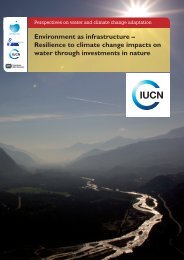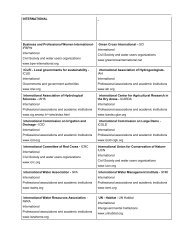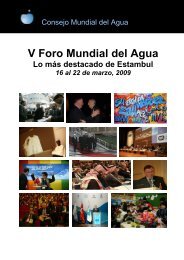the human right to water and sanitation in emergency situations
the human right to water and sanitation in emergency situations
the human right to water and sanitation in emergency situations
You also want an ePaper? Increase the reach of your titles
YUMPU automatically turns print PDFs into web optimized ePapers that Google loves.
- Part 3 - Advocacy on <strong>the</strong> <strong>right</strong> <strong>to</strong> <strong>water</strong> <strong>and</strong> <strong>sanitation</strong> <strong>in</strong> emergencies<br />
sarily as a direct result of deliberate government (or armed opposition) action, an approach that raises<br />
awareness of <strong>the</strong> matter <strong>and</strong> suggests ways of mitigat<strong>in</strong>g <strong>the</strong> situation may be more appropriate than<br />
a focussed denouncement of a violation, for example if <strong>the</strong> authorities fail <strong>to</strong> res<strong>to</strong>re access <strong>to</strong> <strong>water</strong><br />
after a battle, or if <strong>the</strong> power supply is cut <strong>in</strong> ways that affect a <strong>water</strong> treatment plant.<br />
- In cases of long-term neglect, lead<strong>in</strong>g <strong>to</strong> deprivation of <strong>right</strong>s, advocacy may more appropriately<br />
<strong>in</strong>clude references <strong>to</strong> <strong>the</strong> assistance that <strong>human</strong>itarian agencies can offer (for example, where <strong>the</strong><br />
problem is caused by lack of ma<strong>in</strong>tenance of a <strong>water</strong> supply <strong>in</strong>frastructure). However even <strong>in</strong> such<br />
<strong>situations</strong> it may be more apposite <strong>to</strong> raise awareness of <strong>the</strong> <strong>right</strong> <strong>to</strong> <strong>water</strong> <strong>and</strong> <strong>sanitation</strong> <strong>in</strong> order <strong>to</strong><br />
highlight government obligations under <strong>in</strong>ternational st<strong>and</strong>ards <strong>to</strong> ensure <strong>the</strong> exercise of <strong>the</strong> <strong>right</strong> <strong>to</strong><br />
<strong>water</strong>.<br />
13.5. Key challenges <strong>to</strong> <strong>right</strong>s-based <strong>water</strong>-related advocacy<br />
If what has been discussed above clearly <strong>in</strong>dicates that us<strong>in</strong>g a <strong>right</strong>s-based approach for <strong>the</strong> purposes<br />
of advocacy can procure more legitimacy <strong>and</strong> force for <strong>the</strong> messages developed it would, none<strong>the</strong>less,<br />
seem judicious at this juncture <strong>to</strong> revisit a number of challenges or elements which can hamper this type<br />
of approach, especially <strong>in</strong> <strong>the</strong> <strong>water</strong> <strong>and</strong> <strong>sanitation</strong> sec<strong>to</strong>r.<br />
1. It must be said that, <strong>to</strong> some extent, those work<strong>in</strong>g on <strong>water</strong>, <strong>sanitation</strong> <strong>and</strong> hygiene related issues still<br />
resist <strong>the</strong> idea of <strong>in</strong>corporat<strong>in</strong>g <strong>right</strong>s language <strong>and</strong> <strong>human</strong> <strong>right</strong>s <strong>in</strong><strong>to</strong> discussions about access <strong>to</strong> <strong>water</strong><br />
<strong>and</strong> <strong>sanitation</strong>, even <strong>in</strong> terms of advocacy. At times, <strong>the</strong>y perceive <strong>the</strong> <strong>right</strong> <strong>to</strong> <strong>water</strong> <strong>and</strong> <strong>sanitation</strong> as<br />
hav<strong>in</strong>g some “political” resonance. At o<strong>the</strong>rs, <strong>the</strong>y see it as “<strong>in</strong>effective”, or lack<strong>in</strong>g content. Consequently,<br />
o<strong>the</strong>r groups concerned might also feel ill at ease with <strong>right</strong>s language, mean<strong>in</strong>g that reticence about<br />
accept<strong>in</strong>g its <strong>in</strong>corporation <strong>in</strong><strong>to</strong> <strong>the</strong> sec<strong>to</strong>r persists. Be that as it may, we trust that this h<strong>and</strong>book will go<br />
some way <strong>to</strong>wards enhanc<strong>in</strong>g <strong>the</strong> reader’s underst<strong>and</strong><strong>in</strong>g of <strong>and</strong> <strong>in</strong>sight <strong>in</strong><strong>to</strong> <strong>the</strong> added value represented<br />
by speak<strong>in</strong>g <strong>in</strong> terms of <strong>right</strong>s more than <strong>in</strong> terms of needs so far as access <strong>to</strong> <strong>water</strong> <strong>and</strong> <strong>sanitation</strong> is<br />
concerned. All those work<strong>in</strong>g <strong>in</strong> this sec<strong>to</strong>r have a crucial role <strong>to</strong> play <strong>in</strong> improv<strong>in</strong>g <strong>the</strong> situation. In future;<br />
preference must be given <strong>to</strong> capitalization <strong>and</strong> <strong>to</strong> field studies.<br />
2. It could be fur<strong>the</strong>r argued that when <strong>the</strong> <strong>right</strong> <strong>to</strong> <strong>water</strong> <strong>and</strong> <strong>sanitation</strong> is flouted, <strong>the</strong>n so will o<strong>the</strong>r <strong>right</strong>s.<br />
Theory <strong>and</strong> <strong>the</strong> <strong>in</strong>terdependence of <strong>human</strong> <strong>right</strong>s have shown this <strong>to</strong> be true. In turn, <strong>in</strong> practice, it is very<br />
rare that only one <strong>human</strong> <strong>right</strong> is violated <strong>in</strong> isolation from all <strong>the</strong> o<strong>the</strong>rs.<br />
3. It is easier <strong>to</strong> identify cases of violations of political <strong>and</strong> civil <strong>right</strong>s than those of an economic, social <strong>and</strong><br />
political nature. However, <strong>in</strong> contrast <strong>to</strong> violations of <strong>in</strong>dividual civil <strong>and</strong> political <strong>right</strong>s, <strong>in</strong> which a quasijudicial<br />
level of evidence is often required <strong>to</strong> prove that a <strong>human</strong> <strong>right</strong>s violation has occurred, <strong>the</strong> level of<br />
evidence required of those advocat<strong>in</strong>g for economic, social <strong>and</strong> cultural <strong>right</strong>s is different. For example:<br />
- Denial of access <strong>to</strong> potential beneficiaries may constitute evidence of <strong>in</strong>tent <strong>to</strong> violate <strong>right</strong>s, even if<br />
advocates do not identify <strong>in</strong>dividuals who have suffered as a result.<br />
- Damaged or neglected <strong>in</strong>stallations can also constitute such evidence, even when lack of access<br />
prevents identification of victims.<br />
- Statistical data (on health, for <strong>in</strong>stance) can also constitute evidence, particularly when comb<strong>in</strong>ed with<br />
o<strong>the</strong>r factual research.<br />
© ACF - THE HUMAN RIGHT TO WATER AND SANITATION IN EMERGENCY SITUATIONS<br />
81


